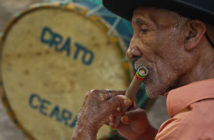AFP
Gnawa culture, a centuries-old Moroccan practice rooted in music, African rituals and Sufi traditions, was on Thursday added to UNESCO’s list of Intangible Cultural Heritage of Humanity.
Gnawa refers to a “set of musical productions, fraternal practices and therapeutic rituals where the secular mixes with the sacred”, according to the nomination submitted by Morocco.
Often dressed in colourful outfits, Gnawa musicians play the guenbri, a type of lute with three strings, accompanied by steel castanets called krakebs.
They practice “a therapeutic ritual of possession… which takes the form of all-night ceremonies of rhythms and trance combining ancestral African practices, Arab-Muslim influences and native Berber cultural performances,” the nomination document reads.
The tradition, which includes the veneration of Islamic holy men, dates back to at least the 16th century.
“Originally practised and transmitted by groups and individuals from slavery and the slave trade”, today it is one of the many facets of Moroccan culture and identity.
Gnawa was popularised by a festival that started in 1997 in the southern port city of Essaouira.
Until then, Gnawa brotherhoods had been little known, even marginalised.
Now, they attract waves of fans each year from across the globe to the Gnawa and World Music Festival in Essaouira that highlights a unique mix of musical styles.
Essaouira has seen greats such as Pat Metheny, Didier Lockwood and Marcus Miller perform with the most famous masters of Gnawa music, fusing the genre with other styles such as blues and jazz.
The number of brotherhoods and master musicians “is constantly growing in Morocco’s villages and major cities”, according to the nomination.
Gnawa groups “form associations and organise festivals” year-round, which enable the younger generation “to have knowledge of both the lyrics and musical instruments as well as practices and rituals” linked to Gnawa culture.







